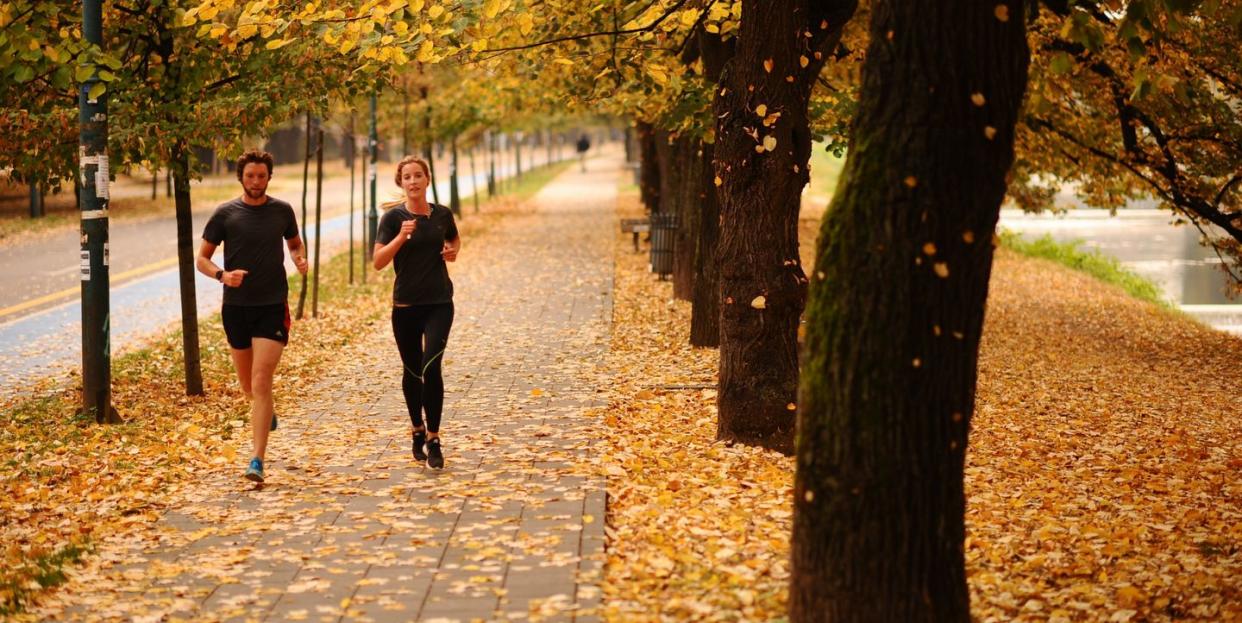London Marathon 2021: Why autumn marathons are better than spring ones

Spring has long been the default season for marathons in the UK. But it really shouldn’t be. Not when there’s a far better (if now slightly enforced) alternative: autumn.
The ‘season of mists and mellow fruitfulness’ is the ultimate time for running a 26.2. Here’s our ode to autumn.
You can mix up running surfaces
Speaking to Runner’s World recently, Tom Craggs, one of the UK’s most in-demand coaches, said that in an ideal world he would have his charges running ‘60 to 70 per cent’ of their marathon mileage off-road. Many elites go even further. Of the dozen or so runs that Sir Mo Farah performs in a typical 130-mile training week, guess how many are on concrete? Just one. During the winter, off-road means ankle-deep mud. In the summer, however, it can mean the hard trails found in almost every park. There’s some evidence to suggest that switching up surfaces reduces the chances of injury, too, as well as providing a new mental stimulus. So, learn from the elites and take in some trails this summer.
Summer running
While a certain masochistic pleasure can be taken in training through the bleak British winter, it’s not exactly an easy sell, is it? Wake up in the dark, shiver for the first few miles, get rained on, repeat. By contrast, summer running is a delight. Lighter mornings, warmer temperatures, longer evenings, drier trails. If you’ve trained all winter for a spring marathon, training during the summer will be a breeze by comparison.
Running in the heat will make you faster
As anyone who took part in the 2018 London Marathon will tell you, training through the winter does not prepare you for an unseasonably hot spring day. Temperatures that day reached 25C and the result was carnage: runners passing out, an unprecedented amount of DNFs and precious few PBs. By contrast, an autumn marathon will usually be run in temperatures lower than what you’ve been training in. And that spells good news for your finishing time.
You’ll train in the daylight
During the winter months, you wake in the dark and you come home in the dark. So whether you run before or after work, you’ll be doing it sans sun. Running in the dark can be exhilarating on occasion, but it can also be a bit dreary and potentially dangerous. Everything changes in the summer: you wake up in the light (unless you’re a milkman) and come home in the light. Early morning and late evening training suddenly becomes so much more appealing.
You don’t have to negotiate Christmas
Unless you happen to be a reindeer, it’s nigh-on impossible to get fitter over the Christmas period. And let’s be honest, the Christmas period no longer lasts a week; it’s a full month of excess, which even the most dedicated runner will find hard to navigate. Emerging from December with your marathon training even vaguely intact is a notable achievement. The summer months are not without their temptations (here’s looking at you, beer garden), but there’s nothing quite on the same scale as Christmas.
Like this article? Sign up to our newsletter to get more articles like this delivered straight to your inbox.
You Might Also Like

 Yahoo News
Yahoo News 
